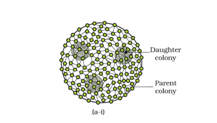Asexual reproduction in chlorophyceae is by
(1) Zoospore formation in Antheriodiophore
(2) Fragmentation
(3) Zoospore formation in Zoosporangia
(4) Both 1 and 2
(1) Zoospore formation in Antheriodiophore
(2) Fragmentation
(3) Zoospore formation in Zoosporangia
(4) Both 1 and 2
Zoospore formed during asexual reproduction in chlorophyceae are
(1) Flagellated
(2) Non-flagellated
(3) Ciliated
(4) Non ciliated
This picture is associated with an organism that belongs to a class. Which of the following features is not correct about that class?

(1) Three types of sexual reproduction
(2) A variety of chloroplast in different species
(3) Inner pectose and outer cellulose in cell wall
(4) Pigments-chlorophyll a and chlorophyll b
A Prothallus is
1. A structure in pteridophytes formed before the thallus develops
2. A sporophytic free living structure formed in pteridophytes
3. A gametophyte free living structure formed in pteridophytes
4. A primitive structure formed after fertilization in pteridophytes
Vegetative reproduction in chlorophyceae takes place by
(1) Fragmentation+ spore formation
(2) Only spore formation
(3) Only Fragmentation
(4) Isogamous
Examples of Green alga is not
(1) Chlamydomonas,Volvox,Ulothrix
(2) Spirogyra
(3) Chara
(4) Fucus
Green algae usually have a rigid cell wall made of an inner layer of ….…. and outer layer of ………
(1) Pectose, Cellulose
(2) Cellulose, Pectose
(3) Algin, carrageenan
(4) Carrageen, Algin
Pyrenoid is
(1) Storage bodies located in cytoplasm of chloropbyceae
(2) Storage bodies located in cytoplasm of Phaeophyceae
(3) Storage bodies located in chloroplast of chlorophyceae
(4) Storage bodies located in chloroplast of Phaeophyceae
Chloroplasts can be discoid, plate-like, reticulate, cup-shaped, spiral or ribbon-shaped in different species. Such variety can be found in
(1) Chlorophyceae
(2) Phaeophyceae
(3) Rhodophyceae
(4) All of these
The members of Chlorophyceae-
(1) are not Green algae
(2) are not unicellular, colonial, or filamentous plant body
(3) do not have pigments chlorophyll a and b
(4) have pigments localised in the chloroplast




